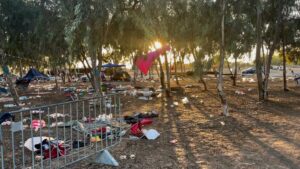
The National Interest Foundation Newsletter
Issue 268, January 10, 2025
Welcome to our NIF Newsletter. In this week’s edition, we delve into an Israeli prosecutor admitting that no evidence has been found to support accusations of mass sexual violence during the October 7th Hamas attack, examine a United Nations envoy’s visit to Yemen in an attempt to quell heightened tensions, and provide analysis on incoming National Security Advisor Mike Waltz’s remarks to Fox News which raised concern regarding the protection of civil liberties.
Editor: Bassam Tarbush
Prosecutor Admits No Evidence Has Been Found to Support Accusations of Mass Sexual Violence on October 7th

Investigations by independent entities into the October 7th attack have also consistently demonstrated that the claims are unproven or outright fabrications. (Photo from BBC)
Prosecutor Admits No Evidence Has Been Found to Support Accusations of Mass Sexual Violence on October 7th
Israeli prosecutor Moran Gez has acknowledged that 15 months after the events of October 7th, 2023, Israel has still not identified any victims in which a case can be brought against an alleged perpetrator of a sexual attack. The admission is in line with the complete lack of any credible evidence regarding incidents of sexual violence, which is particularly notable when these were claimed to have been so widespread. Observers have highlighted that various investigations by independent publications fail to corroborate the accusations, including one by The New York Times which thoroughly canvassed hospitals, rape crisis centers, and assault hotlines, yet could not find a single victim of an October 7th sexual attack. Additionally, when the chief prosecutor of the International Criminal Court (ICC) applied for arrest warrants against senior Hamas officials back in May of last year, this did not consist of any allegations of sexual violence on October 7th – a signal to many that investigators linked to the ICC could also not verify them.
Multiple reports by the United Nations came to similar conclusions regarding the lack of evidence to support October 7th rape allegations, uncovering from the considerable materials that they reviewed “no tangible indications of rape” and an “absence of forensic evidence of sexual crimes.” The UN investigations also debunked numerous Israeli claims about what transpired on October 7th such as the unfounded reports of a fetus being cut from its mother’s womb and other specific allegations of sexual violence that were judged to be false, inaccurate, or contradictory. The reports ultimately concluded that the UN investigators behind them were unable to verify any of the accusations. Israeli prosecutor Gez has herself conceded that “In the end, we don’t have any complainants. What was presented in the media compared to what will eventually come together will be entirely different.” She also pointed out that the absence of evidence does not stem from a failure to try and find it, commenting that “We approached women’s rights organizations and asked for cooperation. They told us that no one had approached them.”
In light of this lack of evidence, it is especially disturbing and regrettable that claims of mass sexual violence on October 7th have been used by some as a means of attempting to justify Israel’s destructive and harmful War on Gaza. It has also been unjustly called upon as a ploy to downplay or altogether ignore the heinous war crimes and human rights violations that Israeli forces have committed against the Gazan civilian population. Israel’s actions in Gaza have resulted in the killing of over 46,000 Palestinians – the overwhelming majority of whom are women and children. The relentless assault and bombardment of Gaza has also led to the forced displacement of more than 90% of its population, which amounts to a whopping nearly 2 million civilians, and has decimated much of the Palestinian enclave. Israel has carried out deliberate attacks against civilian infrastructure and has also been found to have restricted access to much-needed humanitarian aid.
Israeli legal authorities’ own admission that no evidence exists to support accusations of sexual violence on October 7th despite extensive investigations is telling. Too many entities have tried to push this false narrative even in the absence of corroborating evidence, while at the same time, similar accusations with more legitimacy by Palestinians against Israeli forces fail to receive such widespread levels of attention and outrage. The lack of evidence behind the Israeli claims and narratives has rightly spurred skepticism regarding their use as a tool to try and defend the calamitous military assault on Gaza.
United Nations Envoy Visits Yemen in an Attempt to Quell Heightened Tensions

Prior to this trip, UN Envoy for Yemen Hans Grundberg had last visited Sanaa back in May of 2023. (Photo from AFP)
United Nations Envoy Visits Yemen in an Attempt to Quell Heightened Tensions
Earlier this week, United Nations Special Envoy for Yemen Hans Grundberg traveled to the country’s capital city of Sanaa in an effort to ease escalated tensions and push for concrete actions to advance the peace process. This was Grundberg’s first visit there since May of 2023, when he met with Houthi leaders in an earlier attempt to further a roadmap for peace. Tensions in Yemen have heightened during the course of Israel’s ongoing War in Gaza, as the Houthis have struck Israeli targets in the Red Sea and Gulf of Aden as part of a solidarity campaign with besieged Palestinians, which they say will continue until a ceasefire agreement is reached in Gaza. Israel, the United States, and others have attacked various sites in Yemen, with a recent Israeli strike in late December even targeting Sanaa International Airport – which nearly hit World Health Organization (WHO) Director-General Tedros Adhanom Ghebreyesus and his colleagues who were merely meters away from the spot of the attack. As such, UN Envoy Grundberg’s trip to Yemen comes at a very sensitive time amid intensified strikes and escalated hostilities there.
A spokesperson for Grundberg stated that his aim with the visit was to “improve the environment for resolution of the conflict and prepare the ground for concrete actions for advancing the peace process” during a series of national and regional meetings over the coming days. Grundberg is also said to be pushing for the release of UN staff and others currently being held in Yemen. Last month, the envoy warned the UN Security Council that the heightened tensions stemming from the tit-for-tat strikes between the Houthis, Israel, and others had “shrunk the space for my mediation efforts.” This week, Grundberg arrived in Yemen after holding talks with Omani officials in Muscat, where he met with the head of the Houthi negotiating delegation and discussed the need for tangible measures to be taken in order to facilitate peace talks. Both stops also come during a time that has seen ongoing clashes in southwest Yemen between the Houthis and pro-government forces, with mediating officials worried that this poses a significant threat to the two-year lull in major hostilities across Yemen.
The recent heightened tensions in Yemen are the result of intensified Israeli and American strikes over the preceding weeks. In addition to the risk that they pose in potentially exacerbating regional hostilities and conflict, aid organizations have warned that the Israeli strikes in particular – due to their reckless targeting of Yemeni ports, transport sites, and other important infrastructure – could also worsen already dire humanitarian conditions for millions of civilians who have been detrimentally impacted by the longstanding civil war in Yemen. Back in late December, a group of Yemeni and international aid groups published a letter outlining how the airstrikes threatened the ability of Yemeni civilians to access food, electricity, and medical treatment. As the letter pointed out, “the consequences of attacks on civilian facilities will be severe and long-lasting for Yemeni civilians who are already suffering from a decade-long conflict.” Analysts and experts have detailed that while U.S. strikes have been more narrowly targeted on Houthi military sites and equipment, Israeli strikes targeting infrastructure are especially harmful to the availability and affordability of imported goods. U.S. officials have even remarked that Israeli actions in Yemen should not threaten civilians or civil infrastructure.
The current situation in Yemen remains a delicate one due to both the aforementioned regional and domestic dynamics. Given this, it is not at all a surprising development that UN Envoy Grundberg made a trip there this week to try and curb the recent escalation in tensions which risks spilling over into further hostilities that might negatively affect the country and wider Middle East as a whole.
Incoming National Security Advisor’s Remarks Raise Concern Regarding the Protection of Civil Liberties

Waltz expressed plans for a governmental initiative that would troublingly monitor mosques, universities, and other entities. (Photo from The New York Times)
Incoming National Security Advisor’s Remarks Raise Concern Regarding the Protection of Civil Liberties
The soon-to-be national security advisor (NSA) in President-elect Donald Trump’s second administration, U.S. Representative Mike Waltz (R-FL), has raised eyebrows over his recent remarks to Fox News’ Mark Levin. Waltz elicited concern about the protection of civil liberties, or lack thereof, that could potentially be seen under some of the new administration’s policies. He discussed plans for a cross-governmental initiative that would alarmingly surveil universities, mosques, and other entities that are deemed to be a so-called threat to the United States. One aspect that was particularly concerning was Waltz’s demonizing of university protesters who are merely exercising their right to free speech, as he warned that individuals on student visas who engage in these types of civil liberties would be swiftly deported. The incoming NSA also claimed that “terrorists have infiltrated our borders,” despite the fact that the recent perpetrators of terror attacks in the United States have been domestic U.S. Army veterans, not individuals who in any way infiltrated the country illegally and committed acts of violence as Waltz’s comments would imply.
In his comments, Waltz conveyed his belief that “the problems in the Middle East by and large originate from Tehran, not from Tel Aviv.” While the Iranian regime certainly bears culpability for some of the instability in the Middle East, any fair-minded observer or analyst should also rebuke the Israeli government for its destructive role in perpetuating conflict and hostilities across the region as well. Over the past 15 months, Israel has drawn widespread criticism from an array of independent entities for its war crimes and human rights violations in Gaza, and concurrently, has been denounced for provoking further animosities in Lebanon, Yemen, Iran, and elsewhere. Thus, for Waltz to not allude to this, and instead signal unwavering support for Israel despite legitimate and warranted concern over its actions, is problematic. When referencing Trump’s foreign policy agenda, Waltz discussed the intent to revive the Abraham Accords as a way of allegedly promoting peace and prosperity in the region, however, the oft-criticized agreements have been justifiably excoriated for sidelining the Palestinian’ struggle for justice – the root cause that must be addressed in order to pave the way for enduring peace in the region.
The incoming NSA is not the only member of the new U.S. administration to garner attention with his remarks. President-elect Trump himself has done so too with some of his recent comments as well. This has included refusing to rule out using potential military force to take control of Greenland. Countries such as France and Germany have even taken Trump seriously enough to both issue statements defending Greenland’s territorial integrity and warning against the threat of any military action. Additionally, Trump has also raised eyebrows for floating the idea of turning Canada into a U.S. state, refusing to rule out using economic or military action to pursue acquisition of the Panama Canal, and suggesting changing the name of the Gulf of Mexico to the Gulf of America. Analysts have speculated that the Trump remarks related to the Panama Canal and Greenland in particular are aimed at trying to combat the influence of China on the global stage. While some have brushed off Trump’s threats as part of a negotiating playbook, others have concerns about whether he will cross over from harsh rhetoric and economic warfare to actual military intervention.
Mike Waltz has echoed Trump’s sentiments regarding Greenland, arguing that purchasing the autonomous territory within the Kingdom of Denmark is “essential to America’s national security” and that it is about “critical minerals and natural resources like oil and gas.” In another recent interview, Waltz also linked Trump’s desire to acquire Greenland to some of the president-elect’s other proposals related to the Panama Canal, the designation of Mexican cartels as terrorist organizations, and the renaming of the Gulf of Mexico by stating that “This is about reintroducing America in the Western Hemisphere, whether that is taking on the cartels, the Panama Canal, Greenland, the ‘Gulf of America’ – which I love, I’m waiting to see the maps redrawn…You can call it Monroe Doctrine 2.0, but this is all part of the America First agenda and it’s been ignored for far too long.”
